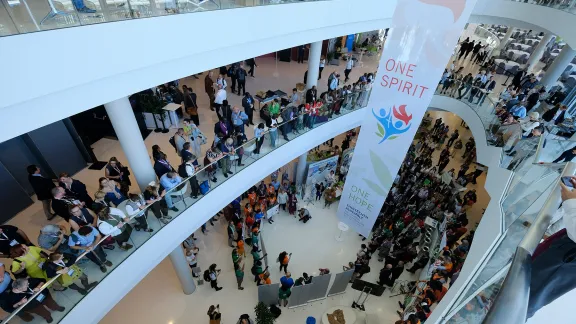What tasks and actions arise for the LWF member churches from the message and other results of the Thirteenth Assembly? Two German churches explored this together at a joint event.

The Thirteenth Assembly, held in Poland under the theme of “One Body, One Spirit, One Hope”, brought together delegates from all regions of the world. Photo: LWF/Marie Renaux
German churches discuss next steps after Thirteenth Assembly
(LWI) - Several months have passed since the Thirteenth Assembly in Krakow, Poland. What questions, impulses and goals are member churches of the Lutheran World Federation (LWF) in Germany subsequently taking up locally? In Eastern Germany, the Evangelical Lutheran Church of Saxony (EVLKS) and the Evangelical Church in Central Germany (EKM) met for a joint conference on this topic.
Many conference participants were present as delegates, in other official functions or as visitors at the Assembly or Pre-Assemblies. Other participants were people interested in international church relations.
Theology and ecumenism
“We took away from the Thirteenth Assembly the invitation to engage intensively with the Augsburg Confession,” said Friedemann Oehme, Ecumenical Relations Officer of the EVLKS. The confession is “a treasure trove of concentrated faith that needs to be re-explored by generation after generation.”
“We want to ask what relevance this confessional writing of the Lutheran churches has for us today,” says Oehme. That concerns its significance for ecumenical cooperation, especially for the dialog with the Roman Catholic Church, but also with the free churches. Globally, the question is what role the CA plays in the different contexts of the Lutheran communion. Reading the CA from different perspectives could “inform a deeper understanding and make it possible to experience the significance of this confession in our churches and congregations.”
Intergenerational justice
Young people’s participation and intergenerational justice were another focus of the conference. The Assembly resolutions sent “a clear message”, said Pröbstin Astrid Kleist, who served as LWF Vice-President for Central and Western Europe from the Twelfth Assembly in Windhoek to the Assembly in Krakow. In the future, “intergenerational justice will be even more relevant.” The younger generation wants to be taken seriously in their issues, “but also in their claim to participate in leadership and power” to “help shape the church and society of tomorrow today.”
Possibilities for implementation within the EVLKS and the EKM were discussed in a workshop. Julia Braband, who served as a youth member of the LWF Council from 2017-2023, presented a project inviting church members from different generations to work together on creation care. In discussions with workshop participants from different generations, it became clear that participation in church leadership at a young age is formative and often leads to long-term commitment on the part of these people. It also became clear that working together is not just about different generations but also about diversity in other areas such as education, gender or origin.
Gender justice
Even ten years after the publication of the LWF’s Gender Justice Policy, “ongoing efforts and clarifications” are needed to implement this guideline, said Kathrin Wallrabe, Project Coordinator of the LWF Women’s Network Central and Western Europe and Gender Equality Officer of the EVLKS. All LWF member churches should know these jointly agreed goals and actively engage in concrete measures to promote gender justice.
“Gender equality is not just about women; it is a transformational movement for the whole communion,” said Wallrabe. “Individuals should be empowered and not be confined to stereotypical roles.”
A three-step “See–Act–Review” process can be used to take concrete steps toward overcoming gender hierarchies.“See” refers to the situation and current statistics regarding earnings, committee appointments, etc., which must be considered.“Act” concerns measures to improve individual and structural equal opportunities. The third step, “Review”, looks at what has improved and what still needs to be changed.
Dialogue and partnership
Generally, participants greatly appreciated the opportunities for encounters during the Thirteenth Assembly, the Pre-Assemblies, and visits to the Assembly. For example, the EKM was in Poland with a group of students from the EKM and the partner churches in Sweden, Slovakia, and Tanzania.
Between Assemblies, partnerships between parishes, church districts and churches from different regions also play an essential role in fostering mutual understanding.
In cooperation with the Leipziger Missionswerk, the EVLKS and EKM dedicated a partnership meeting to the topics of the LWF Assembly. The participants discussed the role of the Assembly themes in their ecumenical partnerships. They also exchanged views on their respective roles in partnership work. Finally, they discussed funding opportunities so that groups can continue to meet across countries.
The experiences of individuals with the work of the LWF and the Assembly were appreciated as strengthening and affirming partnerships and ecumenical encounters.


